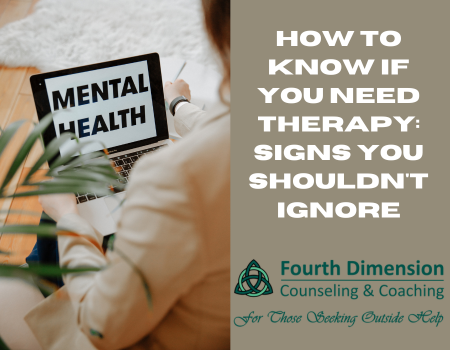Taking care of your mental health is just as important as your physical health, but sometimes, recognizing when you need help can be challenging. The idea of therapy may seem intimidating or unnecessary, but it can be a crucial step toward improving your overall well-being. If you’re struggling with feelings of distress, it might be time to consider professional help. Here are several signs to look out for that may indicate you need therapy—and why you shouldn’t ignore them.
 1. Persistent Feelings of Sadness or Hopelessness
1. Persistent Feelings of Sadness or Hopelessness
It’s normal to feel sad or discouraged from time to time, especially during difficult life events. However, if these feelings persist for weeks or months, it may indicate deeper emotional or psychological struggles, such as depression. When sadness turns into a sense of hopelessness or helplessness, therapy can be an essential tool for exploring and addressing the underlying causes.
Therapists can help you work through these emotions, explore the root causes of your sadness, and develop coping mechanisms to manage difficult feelings. Left untreated, prolonged sadness can interfere with daily activities, work, and relationships.
2. Difficulty Managing Stress or Anxiety
We all experience stress and anxiety from time to time, but when these feelings become overwhelming and uncontrollable, it’s important to take notice. Chronic anxiety can manifest physically through symptoms like rapid heartbeat, trouble breathing, difficulty sleeping, or a constant sense of worry. These symptoms can disrupt your ability to function normally and may worsen if not addressed.
Therapists are trained to help individuals identify triggers for their anxiety, challenge negative thought patterns, and develop practical techniques for managing stress. Cognitive-behavioral therapy (CBT) is one common therapeutic approach used to help individuals reframe anxious thoughts and build resilience in dealing with stress.
3. Trouble Managing Emotions or Anger
If you find yourself having frequent outbursts of anger or feeling emotionally numb, it might be a sign that something deeper is going on. Uncontrolled anger or emotional outbursts can strain relationships, make it difficult to focus at work or school, and cause internal turmoil.
Therapy can provide a safe space for you to explore the underlying causes of these emotional reactions. A therapist can help you develop healthier emotional regulation techniques, such as mindfulness or relaxation exercises, and work with you on addressing unresolved issues contributing to these emotional challenges.
4. Changes in Sleep or Appetite
Sometimes, mental health struggles show up physically. If you’ve experienced significant changes in your sleep patterns—whether you’re sleeping too much or struggling to sleep at all—or if your appetite has drastically increased or decreased, it may be time to seek help. These changes can be linked to conditions like depression, anxiety, or trauma.
A therapist can help identify the causes of these physical symptoms and work with you on strategies to restore balance to your sleep and eating habits. In some cases, therapy might also help you uncover emotional triggers that contribute to your physical health changes.
5. Social Withdrawal or Isolation
Humans are inherently social creatures, and isolating yourself from friends, family, or activities you once enjoyed can be a sign that something isn’t quite right. If you’re avoiding social interactions or withdrawing from your support system, it might be time to consider therapy.
Withdrawal can often be a symptom of depression, social anxiety, or other mental health conditions. A therapist can provide support in overcoming these feelings of isolation, guide you in reconnecting with others, and help you develop the skills to form meaningful relationships again.
6. Substance Use or Unhealthy Coping Mechanisms
Turning to substances like alcohol, drugs, or other unhealthy behaviors to cope with emotional pain, stress, or trauma can be a sign that therapy is needed. While substances may temporarily numb emotional discomfort, they rarely address the root cause of your struggles and can lead to dependency or addiction.
Therapy can help you identify healthier coping strategies and support you in overcoming unhealthy patterns of behavior. Cognitive-behavioral therapy, for example, is often used to help individuals break free from addiction and develop more constructive ways of handling challenges.
7. Unresolved Trauma or Past Experiences
Experiencing trauma—whether physical, emotional, or psychological—can have lasting effects on your mental health. If you find yourself frequently re-living traumatic events through flashbacks, nightmares, or intrusive thoughts, therapy can be a safe space for you to work through these memories.
Trauma-focused therapies, such as eye movement desensitization and reprocessing (EMDR) or trauma-focused CBT, can help you process and heal from past experiences, so they no longer have such a significant hold over your life.
8. Struggling to Cope with Major Life Changes
Life events such as the loss of a loved one, a divorce, job changes, or moving to a new area can trigger a range of emotions. If you’re finding it difficult to cope with major life changes and it’s interfering with your day-to-day functioning, it may be time to talk to a professional.
Therapists can help you adjust to these changes, manage the grief or stress that may come with them, and guide you in adapting to new circumstances in a healthy way.
9. Feeling Out of Control or Overwhelmed
Sometimes, life feels like it’s spiraling out of control. If you’re feeling overwhelmed by everyday tasks, unable to manage your responsibilities, or unsure how to handle even small decisions, therapy can help you regain a sense of control.
Therapists can help you break down overwhelming situations into more manageable pieces and work with you on prioritization, goal setting, and developing positive coping strategies for handling stress.
If you’re experiencing any of these signs, it’s important to take them seriously and consider seeking therapy. A licensed therapistcan offer support, strategies, and tools to help you address the challenges you’re facing, providing guidance on how to navigate life’s difficulties in a healthier, more productive way. Don’t hesitate to reach out for help—you deserve to feel better and take care of your mental health.
